Related Research Articles

Ruth Gordon Jones was an American actress, screenwriter, and playwright. She began her career performing on Broadway at age 19. Known for her nasal voice and distinctive personality, Gordon gained international recognition and critical acclaim for film roles that continued into her 70s and 80s. Her later work included performances in Rosemary's Baby (1968), What Ever Happened to Aunt Alice? (1969), Where's Poppa? (1970), Harold and Maude (1971), Every Which Way But Loose (1978), Any Which Way You Can (1980), and My Bodyguard (1980).

Beatrice Arthur was an American actress and comedian. She began her career on stage in 1947, attracting critical acclaim before achieving worldwide recognition for her work on television beginning in the 1970s as Maude Findlay in the popular sitcoms All in the Family (1971–1972) and Maude (1972–1978) and later in the 1980s and 1990s as Dorothy Zbornak on The Golden Girls (1985–1992).

Rhoda is an American sitcom television series created by James L. Brooks and Allan Burns starring Valerie Harper that originally aired on CBS for five seasons from September 9, 1974, to May 18, 1979. It was the first spin-off of The Mary Tyler Moore Show in which Harper reprised her role as Rhoda Morgenstern, a spunky and flamboyantly fashioned young woman seen as unconventional by the standards of her Jewish family from New York City. The series was originally distributed by Viacom Enterprises.
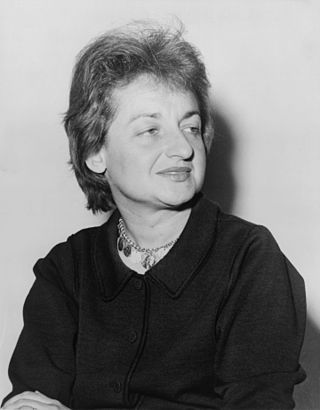
Betty Friedan was an American feminist writer and activist. A leading figure in the women's movement in the United States, her 1963 book The Feminine Mystique is often credited with sparking the second wave of American feminism in the 20th century. In 1966, Friedan co-founded and was elected the first president of the National Organization for Women (NOW), which aimed to bring women "into the mainstream of American society now [in] fully equal partnership with men.”

Maude is an American sitcom television series that was originally broadcast on the CBS network from September 12, 1972, until April 22, 1978. The show was the first spin-off of All in the Family, on which Bea Arthur had made two appearances as Maude Findlay, Edith Bunker's favorite cousin. Like All in the Family, Maude was a sitcom with topical storylines created by producers Norman Lear and Bud Yorkin.

Robin Morgan is an American poet, writer, activist, journalist, lecturer and former child actor. Since the early 1960s, she has been a key radical feminist member of the American Women's Movement, and a leader in the international feminist movement. Her 1970 anthology Sisterhood Is Powerful was cited by the New York Public Library as "One of the 100 Most Influential Books of the 20th Century.". She has written more than 20 books of poetry, fiction, and nonfiction, and was editor of Ms. magazine.
Hindu texts present diverse views on the position of women, ranging from feminine leadership as the highest goddess, to limiting gender roles. The Devi Sukta hymn of Rigveda, a scripture of Hinduism, declares the feminine energy as the essence of the universe, the one who creates all matter and consciousness, the eternal and infinite, the metaphysical and empirical reality (Brahman), the soul, of everything. The woman is celebrated as the most powerful and the empowering force in some Hindu Upanishads, Sastras and Puranas, particularly the Devi Upanishad, Devi Mahatmya and Devi-Bhagavata Purana.

The Feminine Mystique is a book by Betty Friedan, widely credited with sparking second-wave feminism in the United States. First published by W. W. Norton on February 19, 1963, The Feminine Mystique became a bestseller, initially selling over a million copies. Friedan used the book to challenge the widely shared belief that "fulfillment as a woman had only one definition for American women after 1949—the housewife-mother."
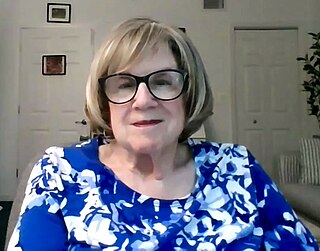
Elaine Showalter is an American literary critic, feminist, and writer on cultural and social issues. She influenced feminist literary criticism in the United States academia, developing the concept and practice of gynocritics, a term describing the study of "women as writers".

Dorothy Emma Arzner was an American film director whose career in Hollywood spanned from the silent era of the 1920s into the early 1940s. With the exception of longtime silent film director Lois Weber, from 1927 until her retirement from feature directing in 1943, Arzner was the only female director working in Hollywood. She was one of a very few women able to establish a successful and long career in Hollywood as a film director until the 1970s. Arzner made a total of twenty films between 1927 and 1943 and launched the careers of a number of Hollywood actresses, including Katharine Hepburn, Rosalind Russell, and Lucille Ball. Arzner was the first woman to join the Directors Guild of America and the first woman to direct a sound film.
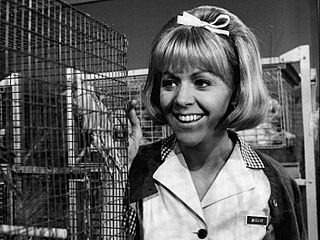
Arlene Leanore Golonka was an American actress. She is perhaps best known for playing Millie Hutchins on the television comedy The Andy Griffith Show and Millie Swanson on Mayberry R.F.D., and often portrayed bubbly, eccentric blondes in supporting character roles on stage, film, and television.
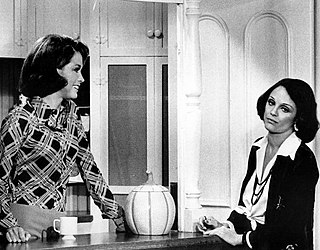
Rhoda Faye Morgenstern, portrayed by Valerie Harper, is a fictional character on the television sitcom The Mary Tyler Moore Show. The character was spun off to the show Rhoda, in which she was the protagonist.

Joan Darling is an American actress, film and television director and a dramatic arts instructor.
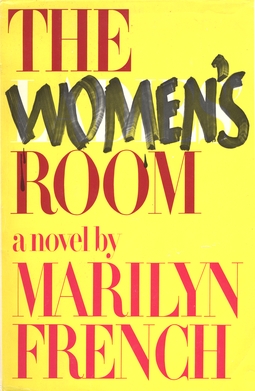
The Women's Room is the debut novel by American feminist author Marilyn French, published in 1977. It launched French as a major participant in the feminist movement and, while French states it is not autobiographical, the book reflects many autobiographical elements. For example, French, like the main character, Mira, was married and divorced, and then attended Harvard where she obtained a Ph.D. in English Literature. Despite the connection of The Women's Room to the feminist movement, French stated in a 1977 interview with The New York Times: "The Women's Room is not about the women's movement … but about women's lives today."
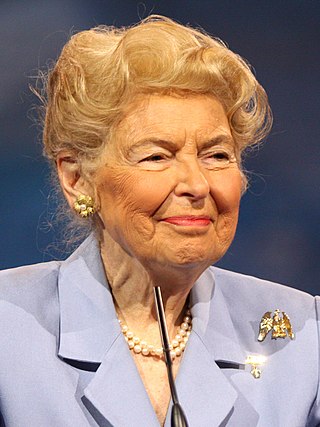
It has been said that Phyllis Schlafly's social policies are a response to feminism.

Rhoda is a woman mentioned once in the New Testament. She appears only in Acts 12:12–15. Rhoda was the first person to hear Peter after God freed him from prison, but no one believed her account that Peter was at the door because they knew he had been put in prison and couldn't believe that he had actually been freed.

The Odd Women is an 1893 novel by the English novelist George Gissing. Its themes are the role of women in society, marriage, morals and the early feminist movement.
"Maude" is the twenty-fourth and final episode of the second season of the American television sitcom All in the Family; the episode also served as the eponymous pilot episode of its first spin-off series, Maude. The episode, directed by John Rich and written by Rod Parker, was videotaped on February 22, 1972, in front of a live audience at CBS Television City in Hollywood, California, and aired on March 11, 1972, at 8:00 p.m. EST on CBS.
The Total Woman is a self-help book for married women by Marabel Morgan published in 1973. The book sold over 500,000 copies within the first year, making it the most successful non-fiction book in the USA in 1974. Overall, it sold more than ten million copies. Grounded in evangelical Christianity, it taught that "A Total Woman caters to her man's special quirks, whether it be in salads, sex or sports," and is perhaps best remembered for instructing wives to greet their man at the front door wearing sexy outfits; suggestions included "a cowgirl or a showgirl." "It's only when a woman surrenders her life to her husband, reveres and worships him and is willing to serve him, that she becomes really beautiful to him," Morgan wrote.
Irma May Kalish was an American television producer and screenwriter who held a pioneering role as a woman in the TV industry. Kalish produced and wrote for television programs, including Too Close for Comfort, All in the Family, The Facts of Life, Good Times, The Hogan Family, Maude, I Dream of Jeannie, F Troop and Family Affair. She is known for writing the episode of Maude where Maude gets an abortion.
References
- ↑ Taylor, Andy (April 7, 1975). "Marabel & Charlie Morgan: Being a Total Woman May Mean Love Under the Dinner Table". people.com.
- ↑ "SEX TREND TAKES A LEAP OF FAITH". Chicago Tribune.
- ↑ "'The Electric Woman'". Chicago Tribune .
- ↑ This Is Our Message: Women's Leadership in the New Christian Right, By Emily Suzanne Johnson
- ↑ Including Proverbs,"A nagging wife is like a continual dripping on a rainy day." https://www.sexinghistory.com/season-1-episode-5-transcript
- ↑ "The Stakes Rise for Chart Toppers - 3/22/2004 - Publishers Weekly". December 8, 2009. Archived from the original on 2009-12-08.
- ↑ "The New Housewife Blues - TIME". September 30, 2007. Archived from the original on 2007-09-30.
- ↑ Sally Quinn (1978-01-27). "The 'Total Woman' May Have Left the Feminists Behind". The Washington Post . Washington, D.C. ISSN 0190-8286. OCLC 1330888409.
- ↑ "Perspective on Women: Feminists Have Killed Feminism: For years, they shamed the majority who loved men, babies, family ties. Now their confessions reveal their hypocrisy". Los Angeles Times. January 23, 1992.
- ↑ "TIME Magazine Cover: Marabel Morgan - Mar. 14, 1977". March 7, 2005. Archived from the original on 2005-03-07.
- ↑ "The Journal of Religion and Popular Culture". Archived from the original on March 18, 2012.
- ↑ "Feminine Fulfillment". TV.com .
- ↑ Stempel, Tom (1996). Storytellers to the nation: a history of American television writing. Syracuse University Press. p. 181. ISBN 9780815603689.
- ↑ ""Rhoda" The Total Brenda (TV Episode 1978) - IMDb" – via www.imdb.com.
- ↑ "Gilmore Girls 1.09 'Rory's Dance'" at gilmorenews.com
- ↑ "Go get 'em, girls". Baltimore Sun.
- ↑ "STAYING ALIVE Years prove kind to icons of the era". Baltimore Sun.
- ↑ "Marabel Morgan - Ohio History Central". ohiohistorycentral.org.
- ↑ "1976 SPECIAL REPORT: "THE TOTAL WOMAN"" – via www.youtube.com.
- ↑ Hard Beginning, Happy Ending, 2017, by Morgan, Marabel
- ↑ "'THE ELECTRIC WOMAN'". Chicago Tribune.